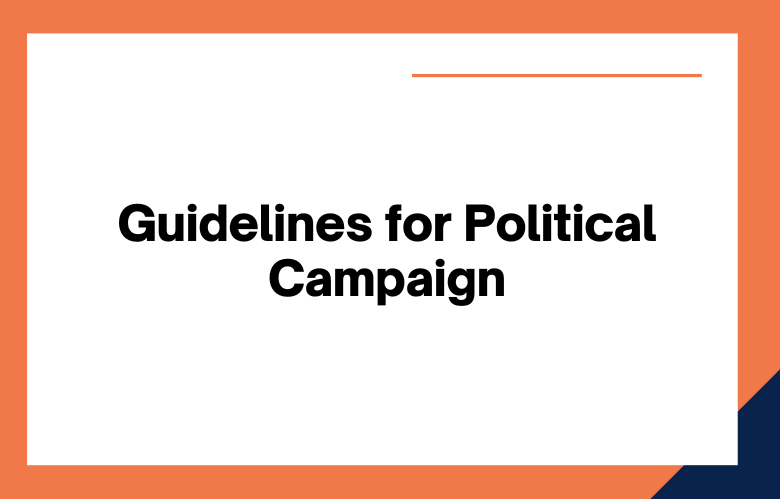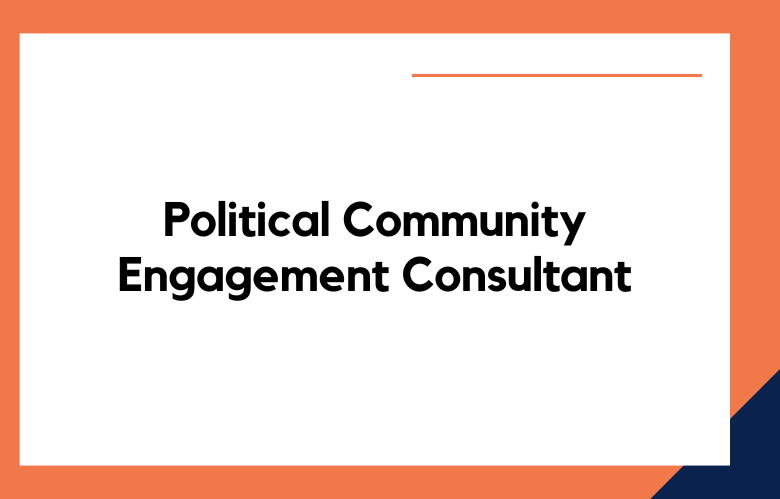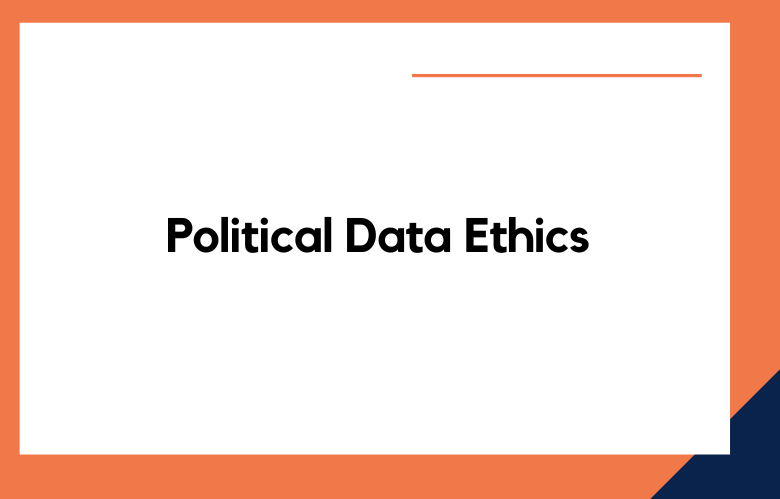A successful political campaign is more than just a catchy slogan and a few television ads. It requires a deep understanding of the issues, an effective outreach strategy, and a well-crafted message that resonates with voters.
Crafting such a strategy can be daunting for even experienced campaigners.
Here are some basic guidelines for developing an effective political campaign strategy.
Crafting a Winning Political Campaign Strategy
Identify Your Target Audience
Every campaign needs to have a clear understanding of its target audience. Who are the people you’re trying to reach? What are their interests and values? What motivates them to vote?
Answering these questions will help you craft messages that resonate with your target audience.
Develop Your Message
You must create your message now that you understand who you’re speaking to. The goal is to develop a concise set of core messages that communicate what makes you or your candidate different from the competition—and why they should support you in the upcoming election.
It might include focusing on specific topics or critical issues, highlighting achievements or credentials, or emphasizing integrity, honesty, and hard work.
Create an Outreach Plan
Once you have your message crafted, it’s time to start communicating it with potential voters. Developing an outreach plan is essential to spreading your message widely.
Consider using traditional methods like direct mailers, television ads, and digital strategies such as social media campaigns and email blasts. Whatever plans you choose, ensure they align with your goals and target audience so they can be most effective.
Develop Your Platform
The first step in any successful political campaign is developing a platform articulating your values and ideas. Ensure that your platform resonates with the people in your district or state so they will be more likely to vote for you.
Remember, this isn’t just about what makes sense to you; it’s about connecting with the people who will vote for you.
Create a Budget
You must create a budget for your campaign to ensure everything goes smoothly and stays on track. It means figuring out how much money needs to be spent on advertising, staffing, printing materials, etc., and allocating funds accordingly.
It also means ensuring that all of the money coming into the campaign is accounted for properly so as not to run afoul of any election laws.
Build Your Team
Having a solid team behind your political campaign is essential for success. Your team should include fundraising, communications, media relations, web design/development, public relations, and politics/law/legislation professionals.
An experienced team of professionals can help guide the campaign’s direction while providing invaluable expertise in their focus areas.
Understand Your Target Audience
Understanding your target audience is essential before developing any political campaign strategy.
Identifying your target audience allows you to tailor your message and resources accordingly. It will also allow you to focus on the demographic most likely to vote for you.
When crafting your message, consider age, gender, race/ethnicity, educational level, and other relevant identifiers that could influence how people view your platform.
Researching current trends in voter behavior will also provide valuable insight into understanding who your target audience is and how they may respond to specific messaging or policy platforms.
Develop Your Message
Once you have identified your target audience, it’s time to develop your message and policy positions.
It is essential that the messaging aligns with the values of those voting for you and those most likely to be swayed by what you have to say.
Crafting concise messages that get straight to the point is vital here; long-winded speeches full of jargon won’t win many voters, so keep it simple!
Ensure any policies or positions presented are feasible and realistic; this means researching beforehand and consulting experts in whatever policy areas are being discussed to ensure accuracy.
Secure Resources
Adequate resources are essential for running a successful political campaign. These include money (for advertising campaigns) and volunteers (for canvassing efforts).
Many campaigns rely heavily on donations from supporters. Still, other sources are available, such as grants or loans from banks or organizations like The Democracy Fund, which provides grants for candidates running for office at all levels of government across the United States.
In addition, having volunteers within local communities helps reach out directly to potential voters, which is often more effective than advertising campaigns alone.
4 Steps To A Winning Political Campaign Strategy
Running for office is no small feat. It takes dedication, passion, and a well-thought-out strategy to run a successful political campaign.
If you’re gearing up to launch your campaign, here are four key steps you should consider when formulating your political campaign strategy.
Research Your Audience
The first step in any successful political campaign is research. You need to understand who your target audience is and what issues they care about most. This will help you craft a message that resonates with potential voters and ensure your campaign focuses on suitable topics.
Researching your competition will help inform your strategy and give you a better understanding of how to differentiate yourself from other candidates.
Develop Your Message
Once you understand who you’re targeting and what issues they care about, crafting a message that speaks directly to them is time.
Think of it as your campaign’s mission statement—concise yet powerful enough to capture the attention of potential voters. This message should be reflected in all aspects of your campaign, including website content, print materials, digital ads, etc.
Build Your Team
A successful political campaign requires more than a great message—it also needs the right people behind it!
Investing in quality staff members or hiring an experienced consultant can make all the difference when running for office; they can provide valuable insight into how best to reach potential voters and ensure that all campaign components run smoothly from start to finish.
Reach Out to Voters
Now comes the fun part—reaching out to potential voters! You can do this in several ways; social media campaigns can effectively spread awareness about your platform while engaging with local organizations and allowing for direct contact with voters in an intimate setting.
If done strategically, traditional tactics such as door-knocking or canvassing can raise awareness about your candidacy.
Basic Guidelines for Political Campaign Strategy
- Define your campaign goals and target audience
- Create a strategy for reaching your target audience
- Craft a message that resonates with your target audience
- Identify critical points you want to make in your campaign
- Plan out how you will spend your campaign budget
- Mobilize volunteers and supporters
- Stay organized and track results
- Research your opponent’s campaign
- Create a strategy for voter contact
- Develop a media outreach plan
- Plan your fundraising efforts
- Manage your volunteers
- Organize your data and track results
- Research your opponent’s strengths and weaknesses
- Draft a strategy based on your findings
- Create a media plan that will reach your target audience
- Mobilize volunteers and supporters
- Raise money to fund your campaign
- Stay organized and keep track of progress
- Celebrate successes and learn from failures
- Research your opponent’s campaign
- Create a strategy and budget
- Develop a message that resonates with voters
- Plan your outreach efforts
- Mobilize your supporters
- Manage your resources effectively
- Track results and course correct if necessary
Conclusion
Crafting an effective political campaign strategy doesn’t have to be overwhelming—it just takes careful planning and execution.
By identifying your target audience, crafting a resonating message, and creating an outreach plan tailored to your goals and audience needs, you can ensure that your political campaign reaches its maximum potential this election season!
No matter where candidates stand on the issues or what means of communication they choose for their campaigns, one thing is sure—all candidates must have a comprehensive plan to win their elections!
With these guidelines in mind – developing such a plan should be easy!
In a political campaign, strategy is everything. The decisions you make about your target electorate, which voters you prioritize, what messages you communicate, and how you spend your time and money will determine whether or not you win on election day.
With so much riding on the line, a comprehensive plan considering all necessary variables is essential.
If you need help developing a winning campaign strategy, our team of experts at Political Campaign Strategy Consulting can help.
We have a proven success record of helping candidates win elections, and we can tailor a unique plan to fit your specific needs.
Contact us today to know more about how we can help ensure you come out victorious on election day.
Call: +91 9848321284
Email: [email protected]











